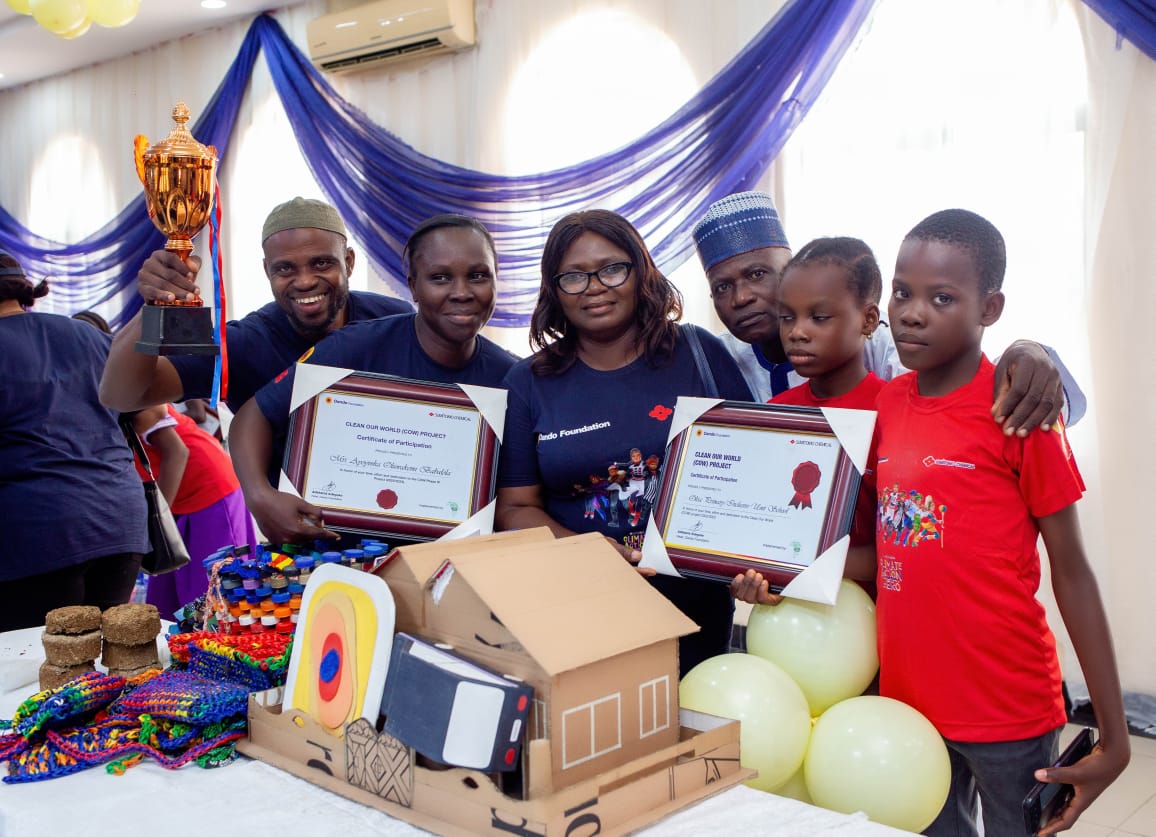
Nigeria has a waste disposal problem – with less than 20 per cent of solid waste collected formally. This is low even in sub-Saharan Africa, where countries record an average of 44 per cent waste collection rate according to the World Bank.
Environmental education has been touted as one of the ways to address Nigeria’s waste problem. The OANDO Foundation chose this approach through its Clean Our World (COW) project. The foundation in 2020, in collaboration with Sumitomo Chemical Japan, took the Clean Our World project the gospel of environmental education, sanitation and recycling to seven schools across three communities in Lagos. The project expanded to 12 schools in five communities in the second phase, and 24 schools in 10 communities in the third phase that ended in July.
According to the foundation, the project since 2020, has helped to remove over 14,023kg of plastic waste from the environment. Public school pupils, teachers, parents, local education authority representatives and community members have been involved in this initiative that encompasses environmental clean-up exercises, gardening, recycling and upcycling of plastic waste and training.
By the end of COW Phase 3 in July, the foundation had impacted over 26,000 people from 24 schools and 10 communities who now understand the importance of environmental protection and recycling of plastic waste. They included thousands of pupils, 258 teachers and community members who were trained to create useful items from plastic and cultivate gardens.
Over the three phases of the COW project, beneficiaries spoke glowingly of how much the project changed their lives.
A teacher who was recognised as one of the school champions during COW Phase III, Mrs. Timilehin Adeleke of Ifelodun Nursery and Primary School, said she learnt to make something out of nothing.
“I feel so excited because this project makes me feel that there is nothing that is impossible. In our community, we brought something out of nothing, and we can imbibe skills into our pupils right from their primary school to become better citizens in Nigeria,” she said.
Because of clean up exercise carried out in his community in Ajeromi Ifelodun Local Government Area during the COW Phase II, Fadeye Sunday, a community member, said the community became cleaner.
“It helped my community, Badia, because it was so dirty. But since we started collaborating with Oando Foundation on the COW project, it has helped our community a lot. We started by cleaning the streets. It empowered our youth, including myself to turn waste to wealth. The steady collection of plastic waste for our homes and streets also reduced blockage of gutters during the rain,” he said.
To ensure sustainability and reach even more pupils across Lagos State, Head, OANDO Foundation, Adekanla Adegoke, said the foundation developed a climate action syllabus and lesson plans for deployment in schools. She said learning resources were developed in collaboration with the Lagos State Universal Basic Education Board (LASUBEB) and Green Hub Africa.
Adegoke added that the syllabus would prepare State Education managers, teachers, pupils and their host communities for a future impacted by climate change.
“COW focused on increasing the pupils awareness and understanding of the long term effects of climate change and the sustainable actions required, whether it be waste management, recycling, upcycling or the green jobs to secure not only their future, but indeed the worlds’,” she said they would be ready.
Programme Manager, OANDO Foundation, Tonia Uduimoh, said the syllabus would help standardise environmental education in Lagos State.
She said: “The last three phases have been exciting, starting from seven schools and now 24 schools across Lagos State.
“We are happy with the syllabus and the lesson plans that have been launched today. Our aim is to standardise the teaching of environmental education across all the schools in the state.
“That way, there’s strength in numbers. The more children know, the more they are able change behaviours that would help preserve our environment.”
Speaking of the importance of the COW project, Board Secretary, Lagos SUBEB, Mr. Hakeem Lamidi, underscored the significance of environmental sustainability education in shaping responsible citizens.
He lauded the COW initiative for using education as a powerful awareness strategy and urged everyone to embrace it in understanding environmental issues better.
On her part, the Permanent Board member in charge of Co-Curricular activities, Lagos SUBEB, Mrs. Sherifat Adedoyin, thanked the OANDO Foundation and its partners for catching the pupils young and promised to support the use of the syllabus across public schools in the state.
“Thank you for catching them young and for pushing the talents in the pupils out.”
The COW project is one of Oando Foundation’s interventions in Nigeria’s basic education sub-sector. Since 2011 when it was established, the foundation has expanded access to education by providing school infrastructure, improving early childhood education, enhancing ICT education and providing scholarship for indigent learners in 88 schools spread across 23 states in Nigeria.
The foundation also trains teachers, local government education supervisors, members of school-based management committees, and engages in advocacy with government, organised private sector and the international community to highlight the challenges of basic education in the country and seek support that would provide the Nigerian child with quality education.






